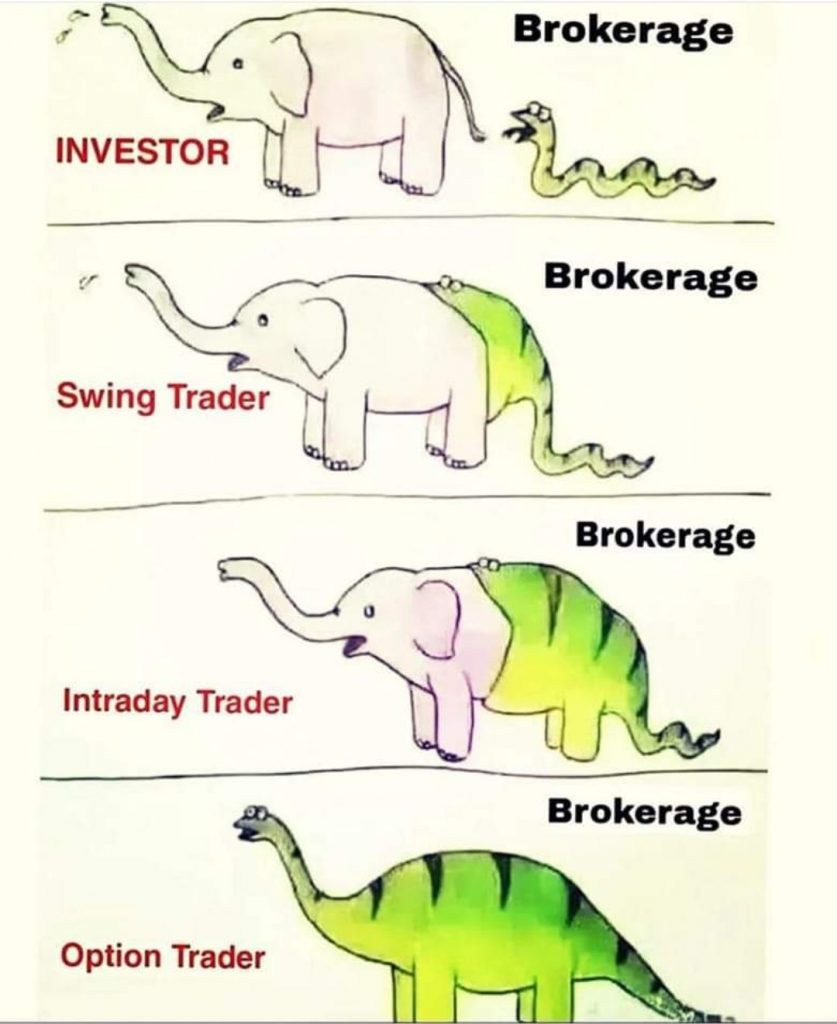Understanding the Impact of Brokerage on Different Traders
There’s an amusing graphic floating around online that humorously depicts the impact of brokerage fees on different types of market participants. The graphic categorizes market players as investors, swing traders, intraday traders, and options traders, highlighting how brokerage fees affect each group.

Brokerage Fees: A Minor Irritant for Investors
For investors, brokerage fees can be a minor irritant but not a major concern. Since investors usually hold their stocks for a long time, the frequency of their transactions is low. This means that the impact of brokerage fees on their overall returns is minimal. Investors can often afford to ignore these fees because they do not eat significantly into their profits.
Swing Traders and Brokerage Fees
Swing traders, who typically hold stocks for a few days to a few weeks, feel the pinch of brokerage fees more than investors. The frequency of their trades is higher, so the cumulative effect of brokerage fees becomes more noticeable. However, with careful planning and strategy, swing traders can still manage these costs effectively.
Intraday Traders and the Heavy Burden of Brokerage
Intraday traders face a much heavier burden from brokerage fees. Since they buy and sell stocks within the same trading day, the number of transactions they execute is much higher. This means that brokerage fees can significantly cut into their profits. Intraday traders need to be acutely aware of these costs and factor them into their trading strategies to remain profitable.
Options Traders: Engulfed by Brokerage Fees
Options traders are depicted as being completely engulfed by brokerage fees in the graphic. This is not far from the truth. Options trading often involves multiple legs per trade (buying and selling different options simultaneously), leading to even higher transaction volumes. As a result, options traders can end up paying a substantial portion of their profits in brokerage fees. This makes it crucial for options traders to seek out brokers with competitive fee structures.
Why Brokers Focus on Traders
There’s a reason why many brokers focus on attracting traders rather than investors. Traders, due to their high transaction frequency, generate more revenue for brokers through brokerage fees. Some top brokers even offer zero brokerage fees for investors while charging traders, essentially cross-subsidizing the cost. This strategy allows brokers to attract a large number of traders who provide a steady stream of income while offering investors a cost-free experience.
Balancing Transaction Costs in Trading Strategies
At platforms like Weekend Investing, strategies are designed with transaction costs in mind. For example, monthly and weekly rebalances are structured to keep transaction costs reasonable. If rebalancing were done daily or even more frequently, transaction costs would increase significantly due to the higher number of trades. The key is to find a balance where the frequency of trades does not erode the profits through excessive fees.
The Importance of Considering All Costs
When evaluating trading strategies, it’s crucial to consider not just brokerage fees but all associated costs, including taxes and slippages. Traders often focus on backtesting their strategies and may overlook these costs, which can lead to an overestimation of their potential profits. Long-term investors typically face lower overall costs, while traders, especially those involved in high-frequency or options trading, need to be more vigilant about the impact of these expenses.

Disclaimers and disclosures : https://tinyurl.com/2763eyaz
If you have any questions, please write to support@weekendinvesting.com











